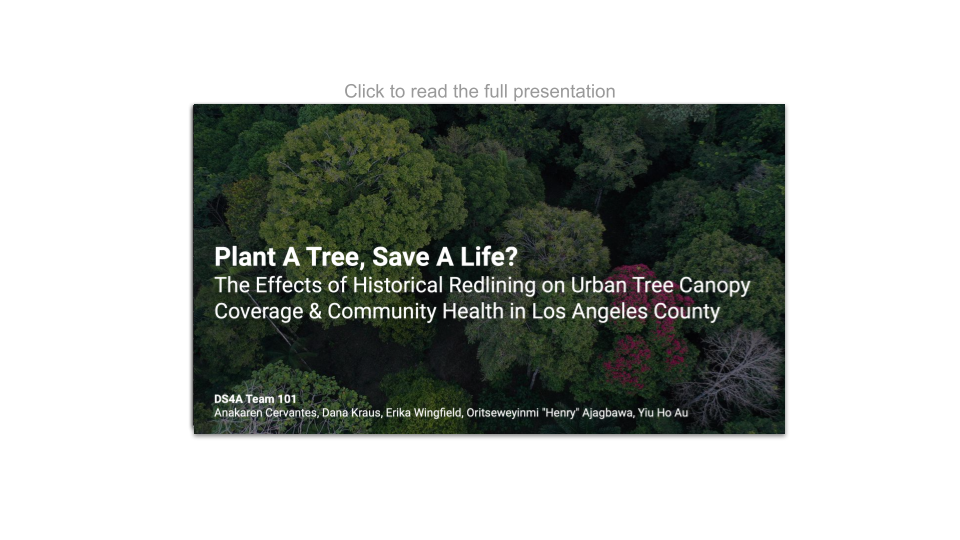DS4A Capstone Project Spotlight: Plant A Tree, Save A Life? The Effects of Historical Redlining on Urban Tree Canopy Coverage & Community Health in Los Angeles County
In this blog series, we're proud to shine a light on some of the top Capstone projects from the first graduating class of Data Science for All / Empowerment. Capstone projects are a critical component of the DS4A / Empowerment curriculum in which teams get together to work on projects that solve real-world data challenges faced by today’s leading companies and public sector organizations.
Meet the Team
Anakaren Cervantes

“I am a government affairs and policy professional with an eclectic academic
background across the humanities and social sciences, including history, public policy, and Latin American Studies. I was originally drawn to DS4A as a unique opportunity to develop a new technical skill, with hopes of pursuing future career opportunities that incorporate the use of data science tools. As a first-generation professional and woman of color, DS4A’s commitment to breaking down barriers for underrepresented professionals in the data
analytics field also resonated with me.Throughout DS4A, I loved learning how to utilize coding to critically work with and visualize data, using this as a tool for breaking down complex problems and communicating with a broad audience. Moving forward, I am excited to deepen my coding and data visualization skills, and to use data analytics frameworks to develop data-informed policies to address major social challenges including poverty, inequality, and climate change.”
Erika Wingfield
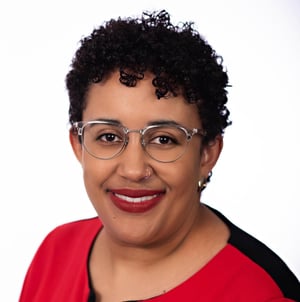
“I am a Client Services Specialist in the billing department of a private cord blood bank in Tucson, Arizona. Previously, I worked for 10 years in the museum field and hold a Master’s Degree in Art History, with a specialization in Baroque and Rococo art.
I applied to this course with the hope that it could assist me in pivoting to a new career path that would utilize Data Science/Data Analytics. I am currently participating in the DS4A/ Anaplan Model Builder program and plan to continue to build upon the skills I learned in DS4A/Empowerment.
In my new career, I aspire to combine the skills that I have learned thus far in my career, with those that I have learned in DS4A.”
Dana Kraus
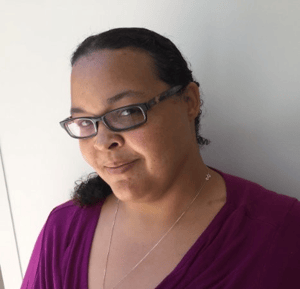
“I’m an experienced IT professional with a strong background in Economics.
My goal is to understand, inform, and shape public policy to better serve everyone, particularly underserved communities.When I started this program it was because I believed that data science was a way to bridge the gap between my technical experience and my education. Now I know it will be a key tool for exploring data and telling the stories underlying economic research and its resultant policies. I chose to join DS4A because I knew it could help me build that critical skill set.
Post-program, I am planning to pursue a PhD in Economics, with a focus on public policy.”
Oritseweyinmi Henry Ajagbawa

“I’m a Graduate student at The University of Southern California studying a Master of Science in Business Analytics. I also have a previous Master of Science degree in Finance & Accounting and an Undergrad in Electrical & Electronic Engineering in The University of Sheffield and Queen Mary University of London respectively.
Having deep interests in Analytics, Data Science, Machine Learning and their applications I was drawn to the DS4A program as this represented an opportunity to continue learning and growing in this space around some of the brightest minds in the world. It’s been a great feeling being part of the DS4A family and growing my network here too.
Post-program, I am looking to launch my career as a Data Scientist, while learning and discovering new things everyday in the pursuit of happiness and improvement.”
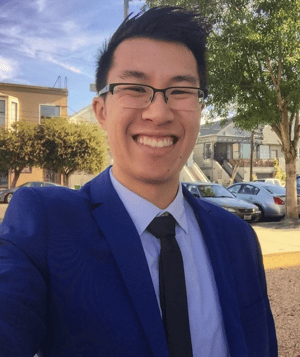
Yiu Ho Au
"I’m an experienced researcher, analyst, and graphic designer. Drawing from
my background in Neuroscience and Psychology, I’m now combining scientific rigor with my passion for data visualization to tell compelling stories with data.As a queer first-generation immigrant, I’m deeply passionate about addressing diversity, equity, and inclusion. DS4A / Empowerment not only helped me further refine my skills, but also broadened my horizons to possible avenues of change/impact.
I’m currently innovating with Evidation Health as a Product Analyst, and would love to further my career in health tech!"
About the Project: Plant a Tree, Save a Life?
Why did you choose this problem to solve?
With the effects of global warming intensifying, addressing environmental inequalities becomes increasingly imperative. Although extensive research has been done studying redlining’s legacy on economic and racial segregation, less work has been done to analyze it’s impact on modern-day urban tree canopy coverage.
Urban trees provide a myriad of environmental and health benefits; trees can help mitigate the urban heat island effect, and improve overall air quality. As such, we assert that historically disadvantaged areas, with lower tree canopy cover, may be subject to increased risk for heat stress and worse respiratory/cardiovascular
health outcomes.
We hope that our research project would not only quantify the impact of this inequity, but also provide actionable recommendations to begin to address the problem.
Project Overview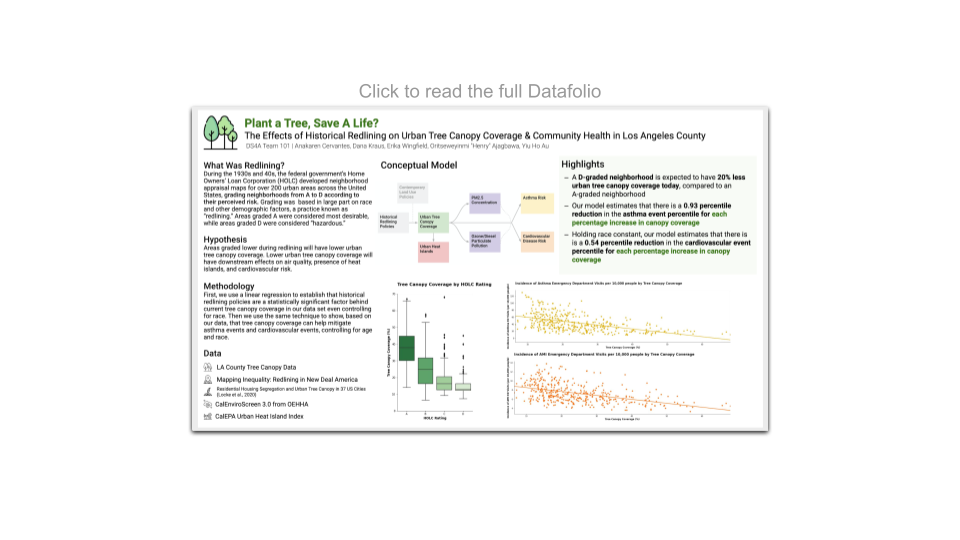
What was the most exciting/surprising finding from your project?
Confirmation of a statistically discernible relationship between historical redlining policies and tree canopy coverage, and its subsequent relationship with community health outcomes. Amidst the excitement around complicated black-box algorithms, DS4A / Empowerment really bolstered the notion of “selecting the right tool for the job.” Our analyses were rooted in the coursework on linear regressions, and Dr. Pillai’s teachings helped us provide a modest, accurate interpretation of results.
What were some challenges you faced and how did you overcome them?
A major challenge was harmonizing 5 disparate datasets from public repositories. Many datasets often lacked adequate documentation (let alone methodology) and required additional fact-finding. It also became imperative to be rigorous in our exploratory data analysis (EDA) to assess data quality. Utilizing GeoPandas, we were able to collate the 5 different datasets into the same coordinate system to produce 1 final, unified dataset used for analysis.
Who is your team's mentor and how did they help?
Our mentor is Alex Aronov, Senior Director and Head of Data Science at Vertex. With 20+ years of experience in research and analytics, provided astute insight and helped elevate our project to another level. Apart from deconstructing our implicit assumptions at the outset of the project, he also challenged us to develop a more comprehensive model and set of analyses. His guidance was truly invaluable, and ultimately contributed to the well-rounded project presented today.
What do you view as the impact of your project?
This project and its findings are a real example of structural inequalities and how they manifest today. Redlining - an explicitly, overtly racist and nativist policy from the 1930’s - can be linked in our data set to an increase in asthma events and cardiac events in Los Angeles in the past decade. Our findings do not establish causality, but they do provide a foundation for what structural inequality means in real terms.






